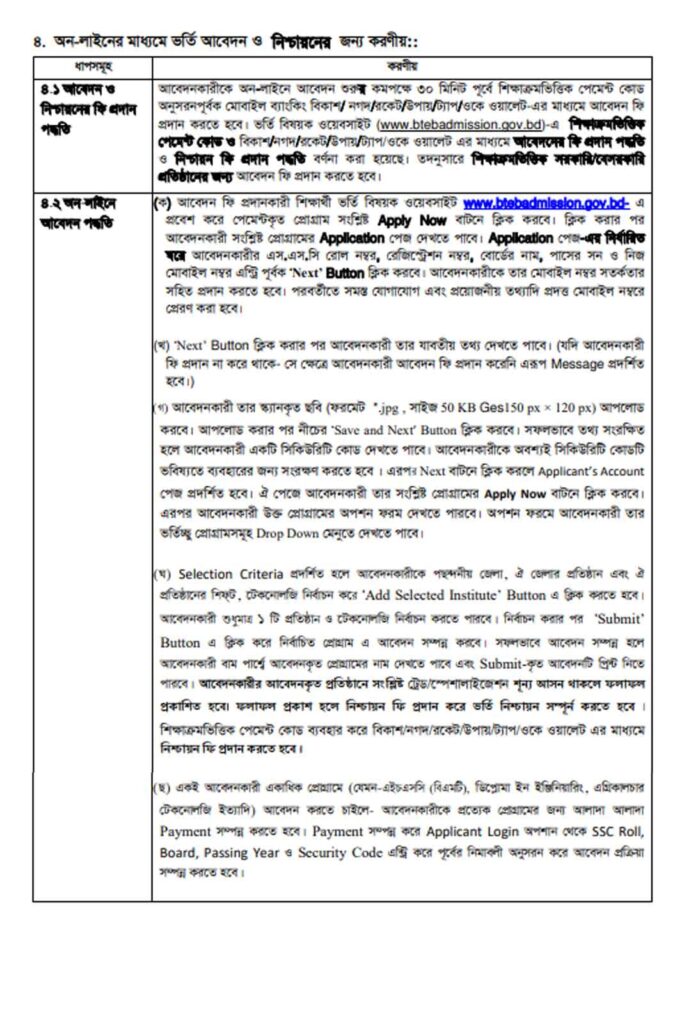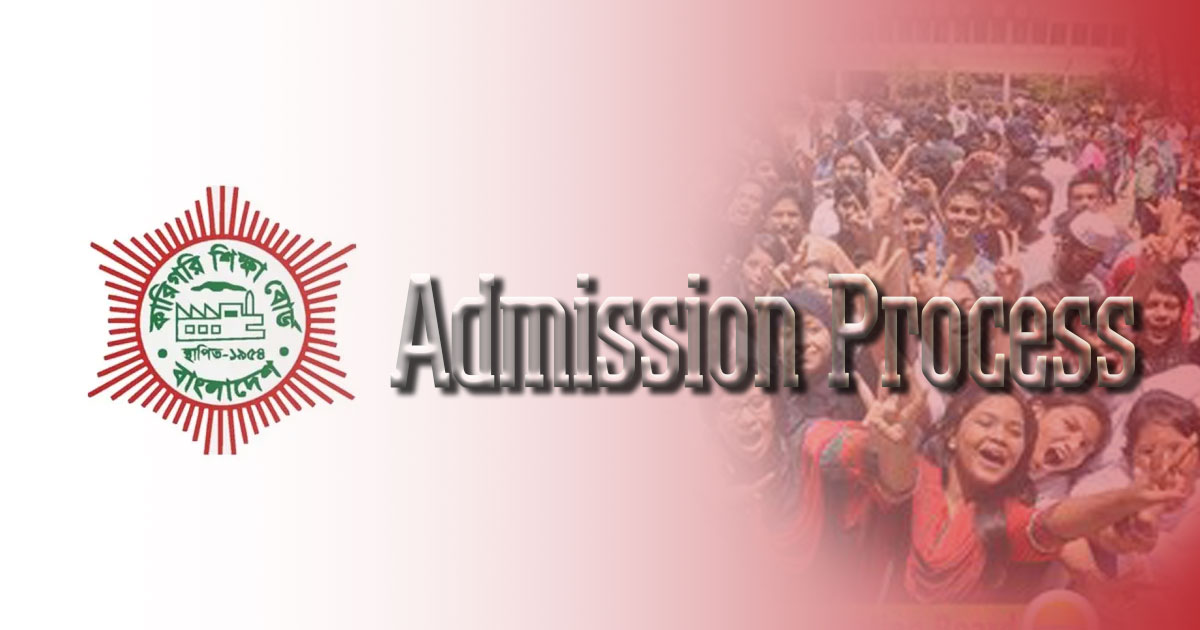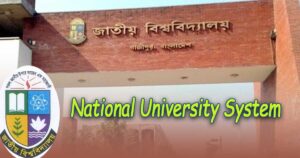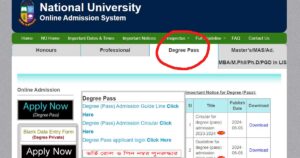BTEB admission is a crucial step for students aspiring to pursue diploma or vocational courses in Bangladesh. The Bangladesh Technical Education Board (BTEB) oversees the admission process for these programs. This step-by-step guide will walk you through the entire process to ensure you are well-prepared for your application.
What is BTEB Admission?
BTEB admission selects students through a competitive process based on their academic performance and entrance exam scores. The board offers a wide range of diploma and vocational courses in various fields, including engineering, technology, business, and healthcare.
Why Choose BTEB Diploma and Vocational Courses?
Choosing a BTEB diploma or vocational course can be highly beneficial for those who prefer practical knowledge and skill-based training over traditional academic programs. BTEB courses provide real-world skills and boost students’ employability in industries like manufacturing, healthcare, IT, and more.
Here’s why you should consider BTEB admission:
- Career-Oriented Training: These programs focus on skills that are directly applicable to the job market.
- Affordable Education: BTEB courses are relatively affordable compared to traditional university education.
- Government-Recognized Certification: BTEB diplomas are recognized by the government and many industries in Bangladesh and abroad.
- Hands-On Experience: Practical training helps students gain valuable work experience.
Step-by-Step Guide to BTEB Admission
Step 1: Check Eligibility Criteria
To be eligible for BTEB admission, you must meet the following criteria:
- Academic Qualifications: Have passed the Secondary School Certificate (SSC) or equivalent examination.
- Age Limit: Generally, there is an age limit, but it may vary depending on the specific course.
- Subject Combinations: Certain courses may require specific subject combinations at the SSC level.
Step 2: Collect Necessary Documents
For a smooth BTEB admission process, gather the following documents:
- SSC/equivalent certificate and transcript
- Recent passport-sized photographs
- Birth certificate or national ID card
- Certificate of previous vocational courses (if applicable)
Step 3: Choose Your Preferred Course and Institution
BTEB offers a wide variety of courses across several institutes in Bangladesh. Research the available programs to choose the one that best aligns with your career goals. Make sure the institution you are applying to is accredited by BTEB.
Step 4: Fill Out the Online Application Form
Once you have chosen a course, the next step is to visit the official BTEB website and fill out the online admission form. Here’s how:
- Visit the official BTEB website: www.btebadmission.gov.bd/website/ and check our posts!
- Find the “BTEB Admission” section.
- Complete the application form with accurate details such as your personal information, educational qualifications, and course preferences.
- Upload the necessary documents.
- Double-check the information before submitting the form.
Step 5: Pay the Application Fee
After submitting the online application, you will need to pay the admission fee. The payment can usually be made through mobile banking services like bKash, Rocket, or at designated bank branches. Keep the payment receipt as proof, as you may need it later in the admission process.
Step 6: Appear for the Admission Test (If Applicable)
Some diploma and vocational courses may require applicants to sit for an admission test. The test will assess your basic knowledge in relevant subjects such as mathematics, general science, or technical skills. Check the official notice or your chosen institute’s website to see if an admission test is required for your selected course.
Step 7: Wait for the Admission Result
Once the admission test is over (if applicable) or after you’ve submitted your application, the BTEB will release a merit list of selected candidates. The list will be published on the official BTEB website, and sometimes you may receive notifications via SMS. If you are selected, congratulations! If not, you may need to wait for a second or third round of admissions depending on the availability of seats.
Step 8: Finalize the Admission Process
After being selected, you will need to confirm your seat by completing the final admission process. This typically involves visiting the institution, submitting the original copies of your documents, and paying the admission and tuition fees. Some institutes may offer online options for finalizing admission.

Additional Benefits of BTEB Diploma and Vocational Courses
Beyond the immediate job readiness that BTEB courses provide, there are several other key benefits to pursuing a diploma or vocational education under BTEB:
1. Industry-Specific Training
BTEB structures diploma and vocational programs to meet the needs of specific industries. Whether you pursue information technology, textile engineering, or hospitality management, these courses offer tailored training that matches industry standards. This approach makes graduates highly appealing to employers, bridging the gap between education and employment.
2. Entrepreneurial Opportunities
BTEB courses often emphasize practical skills, which can open doors to self-employment and entrepreneurship. Graduates from fields such as electrical engineering, automotive technology, and culinary arts, for example, may choose to start their own businesses. This hands-on experience can lead to financial independence, particularly in high-demand fields.
3. Pathway to Higher Education
While BTEB is best known for its vocational training, diploma holders are also eligible for further studies. Many technical universities and institutes offer degree programs that allow students to transfer their BTEB credits. This means that BTEB graduates can pursue a bachelor’s degree in related fields, providing them with more advanced knowledge and broader career opportunities.
4. Job Placement Assistance
Many institutions offering BTEB diploma and vocational courses provide job placement services to help students transition smoothly into the workforce. These services may include resume-building workshops, job fairs, and internship opportunities. This network of support can significantly improve employment outcomes for graduates.
5. Flexible Learning Options
BTEB is constantly evolving to meet the needs of students. Many institutions now offer flexible learning schedules, including part-time and evening courses, making it easier for students to pursue their studies while working or managing other responsibilities. This flexibility is especially beneficial for those who are already employed or seeking to switch careers.
How to Prepare for the BTEB Admission Test
If your chosen course requires an admission test, preparation is key to securing a spot in the program. The test usually covers fundamental topics related to your desired field, such as mathematics, general science, and basic technical knowledge.
1. Understand the Exam Syllabus
The first step to preparing for the BTEB admission test is to understand what subjects and topics will be covered. Typically, the test will include:
- Mathematics: Basic algebra, geometry, and arithmetic
- Science: General concepts in physics and chemistry
- Technical Skills: For certain courses, basic knowledge related to the field, such as electronics or mechanics, may be tested
Review past exam papers or consult study guides to get a sense of the test format and content.
2. Create a Study Plan
Once you understand the syllabus, create a study plan that gives you ample time to review each subject. Focus on areas where you feel less confident and allocate more time to those topics. Set daily or weekly goals to ensure steady progress, and avoid cramming at the last minute.
3. Practice with Mock Tests
Taking mock tests or practicing past papers can help you familiarize yourself with the test format and time constraints. Time yourself during these practice tests to simulate the actual exam experience. This will help you manage your time more effectively on the day of the test.
4. Join a Study Group
Studying with peers can be highly beneficial. By joining a study group, you can discuss challenging topics, share notes, and help each other with difficult concepts. Group studies can also make learning more engaging and less overwhelming.
5. Focus on Problem-Solving Skills
Many admission tests include problem-solving questions that assess your critical thinking and application of knowledge. Focus on honing these skills by working through problems systematically. Break down complex problems into smaller parts and practice solving them step-by-step.
6. Take Care of Yourself
In the days leading up to the exam, make sure you’re taking care of your physical and mental health. Get enough sleep, eat healthy meals, and take breaks during study sessions to avoid burnout. A well-rested mind is more likely to perform well on the test.
How BTEB Courses Help in Skill Development
Skill development is one of the primary focuses of BTEB admission programs. Here are the key ways BTEB courses help students build essential skills:
1. Practical Training
BTEB diploma and vocational courses place a heavy emphasis on hands-on training. Whether it’s working with tools, operating machinery, or using specialized software, students spend a significant amount of time in labs and workshops. This practical experience gives them a solid foundation in real-world skills that are directly applicable in the workplace.
2. Problem-Solving Abilities
The curriculum of BTEB courses often includes problem-solving exercises that teach students to think critically. In fields like engineering, IT, or healthcare, students must learn to diagnose issues and find solutions quickly. This ability to solve problems efficiently is a highly desirable skill in any job market.
3. Technical Proficiency
BTEB’s focus on industry-relevant training ensures that students become proficient in the latest technology and equipment used in their field. For instance, students in mechanical engineering courses learn to operate modern machines, while IT students gain experience in programming languages and software development.
4. Communication Skills
Communication is another critical skill taught in BTEB programs. Many technical and vocational courses include group projects, presentations, and collaborative tasks that require students to communicate effectively with their peers and instructors. These soft skills are crucial in any professional environment.
5. Workplace Readiness
BTEB students gain real work experience through internships, apprenticeships, and practical assignments before they graduate. This prepares them for the dynamics of the workplace, helping them understand job expectations, team dynamics, and professional ethics.
FAQs on BTEB Admission
The BTEB admission process usually starts shortly after the release of SSC results. Keep an eye on the official BTEB website for the latest updates regarding admission dates and deadlines.
Yes, you can apply for multiple diploma courses at different institutes. However, you will need to pay the application fee for each course separately.
The minimum GPA requirement may vary depending on the course and institute. Generally, a GPA of 2.0 or higher in SSC or equivalent is required for most diploma and vocational programs.
BTEB diploma courses typically take 4 years to complete, while vocational programs may range from 1 to 2 years, depending on the course structure.
Yes, some institutes offer scholarships for BTEB students based on merit or financial need. Be sure to check with the specific institution for details.
Some universities may accept BTEB diploma credits, especially for related degree programs. However, this depends on the specific university and program, so it’s important to inquire beforehand.
BTEB admission offers a pathway to a successful career through technical and vocational education that focuses on practical skills, industry-specific knowledge, and real-world experience. By carefully following the steps in this guide, you’ll not only ensure a smooth application process but also increase your chances of securing admission to your desired course.
Whether you’re aiming to build a career in engineering, IT, healthcare, or any other vocational field, a diploma from BTEB can equip you with the skills needed to thrive in today’s competitive job market.
For those preparing for the BTEB admission test, make sure to review the syllabus thoroughly, create a study plan, and practice regularly. With the right preparation, you’ll be well on your way to joining one of the many respected BTEB programs.






Vivamus consectetuer risus et tortor. Lorem ipsum dolor sit amet, consectetur adipiscing elit. Integer nec odio. Praesent libero. Sed cursus ante dapibus diam. Sed nisi. Nulla quis sem at nibh elementum imperdiet. Duis sagittis ipsum.